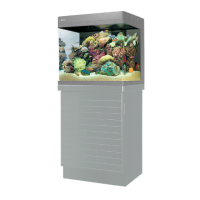49
User Manual
Coral
Most symbiotic corals need to supplement the products of
photosynthesis with hosted zooxanthellae. Very few species are
truly autotrophic; most will slowly starve if not fed in captivity.
Unfortunately the aquarist cannot always discern such a gradual
process; the net daily deficit amounts to only a few percent.
Most popular coral specimens feed on zooplankton; other
nanoplankton (bacteria, floc, mucus) or absorb nutrients from
the water. Most corals require feeding.
Anemones
Anemones consume pieces of mussel or shrimp, placed directly
on the tentacles or mouth.
Fish supply stores stock many different commercial liquid foods.
We recommend Red Sea CoralGro. CoralGro's complete, balanced
formulation supplies all the nutritional requirements for marine
invertebrates.
Monthly reef care: water changes
While we recommend changing 10% of the tank water every
week, if that proves too difficult, replace 25-30% of the water
at least once a month. Frequent partial water changes help to
dilute undesirable substances.
1. Siphon away the amount of water to be replaced.
2. Pre-mix the replacement seawater to achieve the temperature
and specific gravity that match the tank water parameters.
3. Slowly add the newly mixed water.
4. Check the parameters again, and adjust as necessary.
Take this opportunity to vacuum part of the substrate or bare
bottom and bare live rock areas, rearrange the décor and perhaps
move around some of the livestock.
Bimonthly or longer-term care
Some reef care activities need not take place as frequently.
Review the following list for details:
Change the carbon filter
Replace the active carbon filter every two months.
Clean the bio-filter media
Every 3-4 months, clean the bio-filter of accumulated debris.
Immerse it in clean saltwater and shake gently, so as not to
damage the fauna.
Clean the pump impellers and housing
Calcium carbonate builds up on the pump motors. Every 6 months,
submerge each pump in a mixture of hot water and vinegar.
Remember to properly turn off and disconnect each pump.

